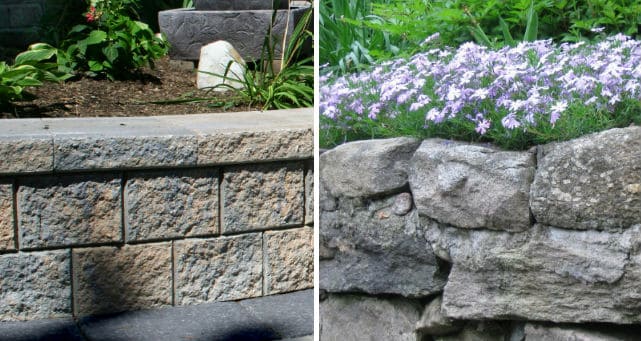A well-designed landscape can be inspiring, consider creating visual interest by adding garden walls. Changing the heights in your garden is one sure way to improve curb appeal on a once boring, flat yard. A low retaining wall or garden wall might be just what your landscape needs.
Concrete vs Stone walls?
The difference between the |”look and feel” concrete versus stone walls has become more indistinguishable as technology continues to evolve in concrete forming. Here is a list of pros and cons for both concrete and natural stone walls.
Concrete Walls
Modern concrete walls are not the ones you think of in cold, commercial plazas. They have much improved over the years and come in a variety of shapes, textures and colours allowing it to blend in well with the yard, garden and the exterior of the house.
Pros
- Lightweight – Machinery is usually not necessary when installing concrete garden walls, most attempting this DIY project are able to lift one or two blocks at the same time. Concrete products are usually compact and easy to work with.
- Quick and easy install – The integral lip or tongue-and-groove system interlocks the blocks and makes the installation fast and easy. You simply drop the blocks in place. Just be sure to stagger the vertical joints between rows.
- Versatile design – The shapes that this material comes in allows for curves in the design and much more versatile than stone.
- Inexpensive – The cost to make a garden wall out of concrete is less expensive than using natural stone and is widely available at home centers.
Cons
- Requires a strong and level base – Leveling a concrete garden wall requires more tedious leveling, it is imperative that your base (4 to 6”) is perfectly level before installing. We do not want the wall to shift. Unfortunately, this means more digging and base material required.
- Cutting with a saw – Cutting is required when installing a concrete garden wall. A special saw is required to cut these materials during installation.
Stone Walls
Natural stone (Armour Stone/rock) of different shapes and sizes fit tightly together when stacked to form a wall. Stones create the nicest-looking walls but are more costly and it will take much more skill and creativity to build as they are also much heavier.
Pros
- Less time is spent on the base when installing Armour Rock because most rocks are not perfectly level to begin with, most applications do not need tedious leveling.
- Strength – Strength is one of the biggest reasons why a natural stone wall built out of Armour Rock is a terrific option for a garden wall, the sheer weight of an individual rock will make it next to impossible to shift or move.
- Best-looking – Natural Stone is currently the trendiest option for landscaping; it offers great curb appeal to all homes. With increased competition within the industry natural stone is more affordable than ever before.
Cons
- Too heavy – Weight is a problem when using Armour Rock, most of the time a machine (skid steer) is used when installing Armour Rock.
- It is much more difficult to install Armour Rock on a tight radius, most of the time you are limited to straight/linear designs.
- Harder to work with – Stacking Armour Rock is difficult because of the various heights, skill and experience is important when selecting specific Armour Rock.
The finished product looks complicated but is a fairly simple project. Be sure to do your research. Regardless of the material you choose to build your new garden wall, with a little planning and effort, you will soon have a new focal point in your yard and a new home for your flowers and plants.
For more free landscaping advice, please contact us and we will be more than happy to help you out.

